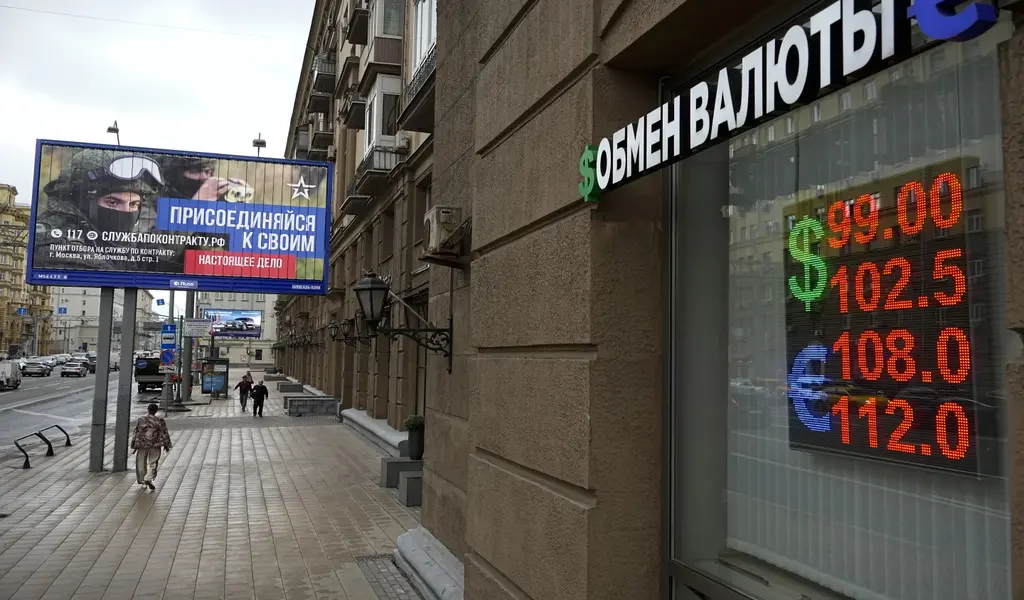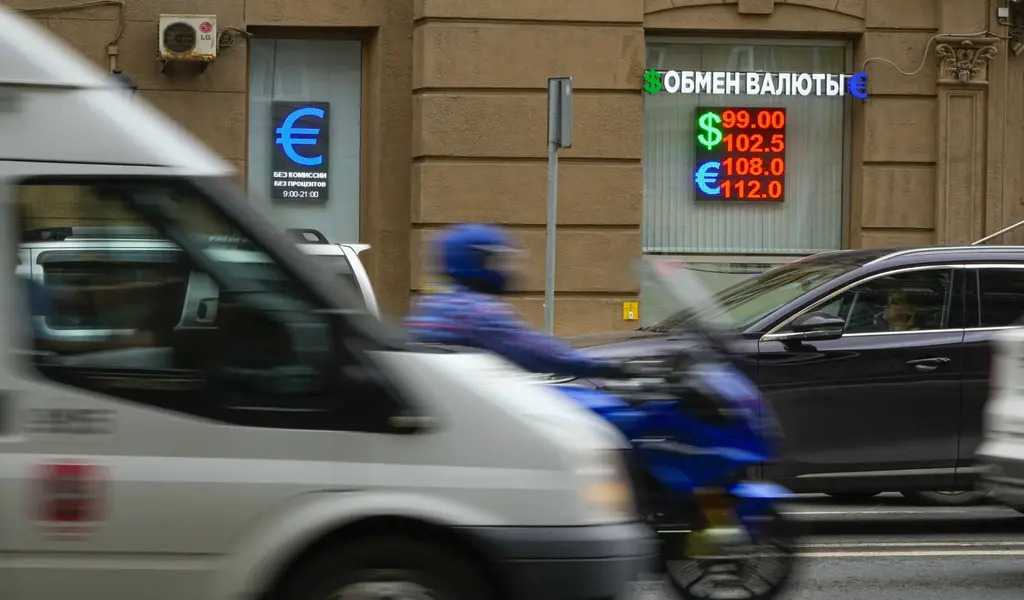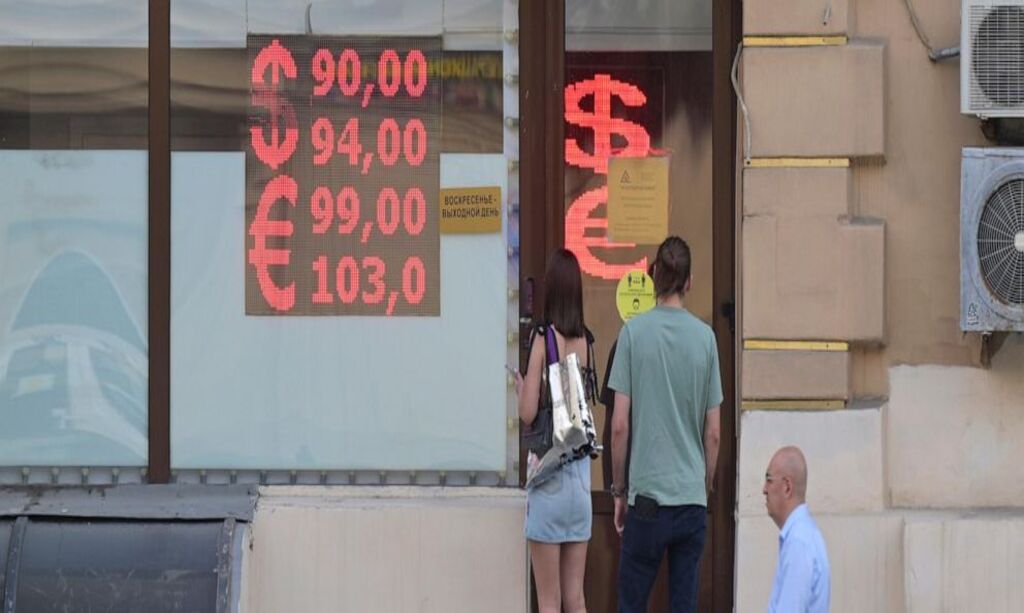Business
Russian Ruble’s Odyssey Through Conflict And Economic Choices: Central Bank’s Intervention Plan

(CTN NEWS) – Amidst the ever-evolving tapestry of geopolitics, Moscow’s fiscal allocation towards its military apparatus, coupled with the reverberations of Western sanctions on its energy exportation, has culminated in the Russian ruble’s plummet to nadirs not witnessed since the embryonic days of the Ukrainian imbroglio.
The valor of the Russian ruble has sustained a precipitous decline of over a quarter since the inception of this annum, cascading to its nadir in the annals of time, a span spanning almost seventeen lunar cycles, as Monday unveiled the equilibrium where 101 rubles bore parity with a singular dollar.
The Ruble’s Trajectory: Perspectives on its Enervation and the Road Ahead from Key Economic Figures
Maksim Oreshkin, the preeminent economic counselor to President Vladimir Putin, imputed the enervated currency to the tenets of a “liberal monetary ethos” within a treatise disseminated through the conduit of the official news organ Tass on the vernal eve.
He espoused that the robust sinews of the Russian economy derive succor from the ascendancy of a potent ruble, whereas its enervation “beclouds the panorama of economic reconfiguration and exerts a pernicious sway upon the material emoluments of the populace.”
Oreshkin vociferated with conviction that the depository apparatus helmed by the Russian Central Bank stands equipped with “all requisite instruments” to ensconce a paragon of stasis, auguring that the unfolding temporal epochs would bequeath a restoration of the status quo ante.
As opined by the deputy custodian of the central repository, Alexei Zabotkin, the axiomatic mandate for the sustenance of a fluctuating exchange rate resides in its capacity to inure the economic edifice vis-à-vis the capricious undulations of the extrinsic vicissitudes.
As proffered by erudite observers, the crescent corpus of imports, a concomitant of burgeoning disbursements in the arena of national defense, and the concomitant recession in the echelons of exports.
Particularly within the precincts of the hydrocarbon domain, bear forth as the preeminent impetuses unfurling the skein of the ruble’s depreciation.
The dilution of the commercial surplus stems from the advent of heightened imports in consonance with the ebbing tides of exports, concomitantly engendering an onerous yoke upon the valiance of the nation’s currency.
Russian Economic Strategy Amidst Conflict: A Comprehensive Outlook on Government Directives and Monetary Measures
In the contemporary context, the Russian economic sphere finds itself engaged in multifarious categories of governmental directives linked to conflict, encompassing textile conglomerates, pharmaceutical ventures, and the alimentary trade.
Alexandra Prokopenko, a nonresident scholar affiliated with the Carnegie Russia Eurasia Centre and a former dignitary of the Russian central banking institution, has expounded that the potentiality of escalating inflation is concomitantly augmented when the entirety of the economic apparatus adopts a wartime stance.
An edict from the central bank, issued in the preceding week, proclaims its cessation of procuring foreign currencies from the domestic market until the culmination of the present year.
This strategic move is devised to buttress the stability of the ruble and curtail market volatility, thereby mitigating the prospective eventuality of amplified inflation.
Traditionally, Russia engages in the procurement of foreign currencies during times of surplus and proceeds to vend them during periods characterized by a dearth in revenues stemming from the exportation of oil and natural gas.
Furthermore, the central bank has undergone a significant elevation of its pivotal interest rate within the bygone month, registering an augmentation of 1%.
This decision is motivated by the envisaged persistence of inflationary trends and the amplified jeopardy posed by the devaluation of the ruble.
The prevailing rate, presently quantified at 8.5%, holds the potential to undergo further escalation during the imminent convocation scheduled for the fifteenth of September.
Ruble Ripples: Moscow’s Economic Odyssey Through Currency Fluctuations and Geopolitical Turmoil
In the city of Moscow, certain individuals of Russian descent found themselves apprehensive on the day designated as Monday, beset by concerns surrounding the waning strength of their national currency.
“The escalation of prices appears inevitable, ushering in a diminution of our accustomed standard of living. Undoubtedly, a surge in the ranks of the economically disadvantaged is inescapable.
Consequently, the ruble’s value has already descended precipitously, with the prospect of further deterioration looming on the horizon,” remarked Vladimir Bessosedny, a retired educator of 63 years.
In stark contrast, there existed a cohort who harbored aspirations that the ruble’s depreciation would prove ephemeral, subsequently reverting to a state of stability.
During the initial month of January, the ruble sustained an exchange rate of approximately 66 units per dollar; however, subsequent months witnessed its value diminishing by approximately one-third.
In the aftermath of the military incursion into Ukraine during February of 2022, Western nations imposed sanctions, inducing a downturn in the ruble’s value, which plummeted to as low as 130 units per dollar.
Swift action by the central bank, characterized by the enforcement of stringent capital controls, facilitated a measure of stabilization. By the following summer, the ruble regained some ground, attaining a valuation within the range of 50 to 60 units per dollar.
In a communication delivered on the preceding Friday, Zabotkin communicated that a substantial segment of imports into Russia had encountered severance due to the ramifications of international sanctions.
This development played a contributory role in the ruble’s depreciation. However, he contested the notion that the flight of capital from Russia was likewise culpable, asserting that such allegations lacked empirical substantiation.
RELATED CTN NEWS:
Asia-Pacific Markets Slide On Monday, Driven By Hong Kong’s Hang Seng Index’s 2% Drop






























